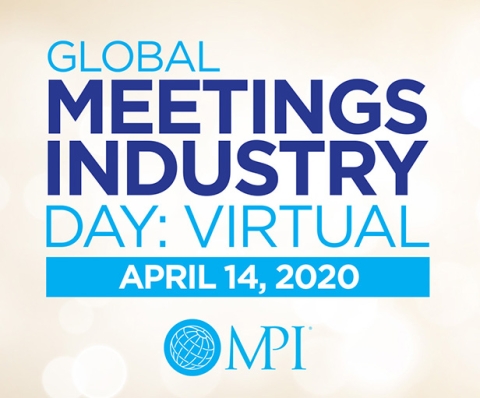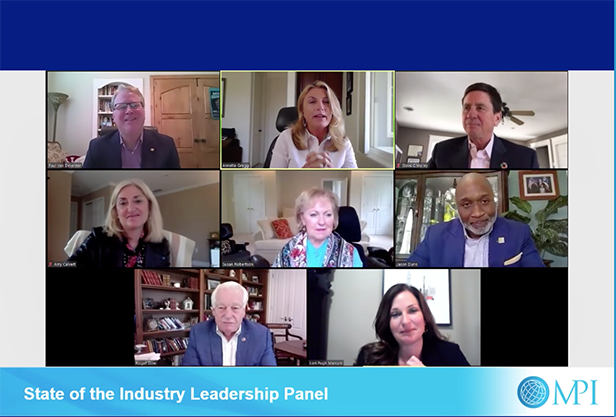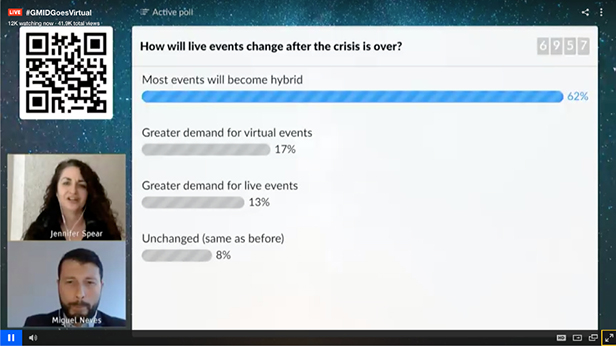Virtual GMID Highlights Industry Collaboration Amid Uncertainty

More than 13,000 attendees came together online for Virtual Global Meetings Industry Day on April 14. While the message from industry experts was optimistic and hopeful, the celebration was tempered by uncertainty on when it will be safe to meet in person again.
The 30-minute grassroots #GMIDGoesVirtual event attempted to break the Guinness World Record for largest audience for a virtual conference, and while it did not quite hit the 15,000 mark that was needed, the turnout was impressive. Hosts Miguel Neves and Jennifer Spear kept the audience engaged with conversation and polls, and talked about two industry foundations providing financial help for event professionals affected by the pandemic: The Above and Beyond Foundation and SEARCH Foundation.
MPI’s 12 hours of live virtual programming, which included participation in the record-breaking attempt, ran the gamut from factual to predictive. In the State of the Industry Panel, industry leaders shared their stories on how the COVID-19 pandemic is affecting their associations and business, and discussed what the future may hold. The panel, moderated by Annette Gregg, senior vice president of experience for Meeting Professionals International, included:
· Roger Dow, president and CEO, U.S. Travel Association
· Steve O’Malley, division president, Maritz Travel; Board chair, Meeting Professionals International
· Paul Van Deventer, president and CEO, Meeting Professionals International
· Susan Robertson, president and CEO, ASAE
· Amy Calvert, CEO, Events Industry Council
· Jason Dunn, group vice president, Cincinnati USA Convention & Visitors Bureau; Chair, National Coalition of Black Meeting Professionals

The panelists were frank about the current state of the industry and the plight of associations, but optimistic about the future. Calvert emphasized resilience and helping industry members cope as the primary focus for now, and all panelists agreed that this should be a top priority. Putting this into action, Dunn mentioned that NCMBP is calling every member to check in and see how they are doing.
Losses Impacting the Events Industry and Associations
Dow provided sobering numbers on travel and hospitality industry losses. “Put in perspective, our industry has 5.9 million unemployed people out of 14 million in the U.S,” he said. “That is 40 percent of the [overall unemployed statistic], but only 3 percent of the GDP. [However,] loss in revenue to our industry directly will be well over $400 billion — that’s $900 billion to the GDP.”
These losses are hitting associations hard. “A lot of associations are in survival mode,” Van Deventer said. “We have to worry not just about our community and our members but how we sustain ourselves to be around for the next generation of professionals.”
The hit to the hospitality industry was originally projected to be six times that of 9/11, but Dow said that has now increased to seven times. He noted that the USTA is lobbying to increase the amount of government aid funds allocated to the industry and promoting the importance of fast recovery.
Turnaround Time Remains Unclear
Dow mentioned (uncited) research saying that 83 percent of people want to meet again, and 78 percent want to meet even more often. But it is not clear on when this can (or should) happen.
MPI’s World Education Congress is scheduled for June 6-9 in Grapevine, Texas, and O’Malley said that Maritz still has more than 300 programs on the books for the month of June, many of which are still live events. He added that many of their cancellations have turned into rebookings, and he's hopeful they could see demand generate in the near future. O’Malley also said that events for healthcare and financial services industries appear to be coming back the fastest.
However, participant comments indicate concern that June may be too soon for people to feel safe traveling and meeting, even if restrictions are lifted.
Virtual is Not a Threat
After the 2008 market crash, virtual events were seen by many associations and event organizations as a threat to live events. This was the same time that the Meetings Mean Business Coalition was formed to protect and advance live meetings as a crucial part of business initiatives and revenue generation.
Now, COVID-19 may end up changing the face of meetings irrevocably. A poll taken during #GMIDGoesVirtual, however, indicates that the majority of participants believe that the future is virtual — however, the panelists believe hybrid events are a more likely result.

Calvert stressed that virtual is not the enemy: “[Virtual event technology] is not any kind of threat to us,” she said. “It is a way to expand our offering by layering on that digital offering almost every time going forward.”
O’Malley said that he felt digital or virtual events are filling a gap, but that hybrid events may be the way of the future. There is an opportunity for us to get more sophisticated in how we are sharing things more broadly than for just those who can actually attend face to face, he added.
Robertson also said hybrid events are the way of the future. This crisis, she noted, is a catalyst to revisit traditional association and event models and ways of going to market.
“We have the ability to use technology more than before, particularly as we engage our volunteers,” she said. “We need to think about how to do that and complement ways we conduct meetings and conferences. Some events might be smaller, but then it is our job to make the experience as rich and deep as it can be.”
Van Deventer quoted an analogy he attributed to Brad Dean, CEO of Visit Puerto Rico, calling this time a “George Bailey moment.” The world is learning what it is like to be without hospitality and live events, he said, much like Bailey learned what his town, and the people in it, would be like without him in the classic movie “It’s a Wonderful Life.” The result, he predicts, will be a greater appreciation for face-to-face meetings and events.
Calls for Collaboration and Leadership
Dow called for the industry to come together and “control its destiny” by defining new standards around things like how many people can sit at a round table, how far apart chairs should be set and how many people can congregate in any given space.
“It’s so important to have one industry, one voice,” he said. “One plus one can equal five or six or seven. It is so important for us to come together and really show people the value of what we do.”
Calvert said that the EIC is focusing efforts on becoming a repository of resources on relief efforts, as well as providing support for the organization such as ASAE and USTA that are spreading the message about the impact of COVID-19 on the events industry.
She couched leadership in terms of teamwork and collaboration. “Together, we are stronger,” she said. “[When] you are faced with leading through a crisis or being part of a team through a crisis, it is a unifying moment for your team. You need to be comfortable with not necessarily having all the answers at one time, but understanding the importance of being present and leading with both your heart and mind.”
Robertson stressed the need to embrace more collaboration — and different, innovative types of collaboration a la Apple and Google teaming up. She also encouraged everyone to be a leader, no matter where they may sit within an organization. “You have an opportunity to step up and help the organization in ways you have never before,” she explained.
Resources/What’s Next?
MPI is making its entire MPI Academy library of recorded webinars available to everyone as a free resource, and offering special membership discounts:
• Sign up for a 3-month complimentary MPI membership with promotion code GMID3Mos
• Get $100 off a 12-month membership and receive $100 off your choice of one certificate course with promotion code TrustedResources2020
Visit the GMIDGoesVirtual What’s Next page to:
• Share your ideas on how we can help the meetings and events industry move forward
• Learn more about The Above and Beyond Foundation and SEARCH Foundation, and find out how you can help, or if you qualify for assistance
• Share videos or photos on social media promoting the events industry with the hashtag #WhyIMeet


Add new comment